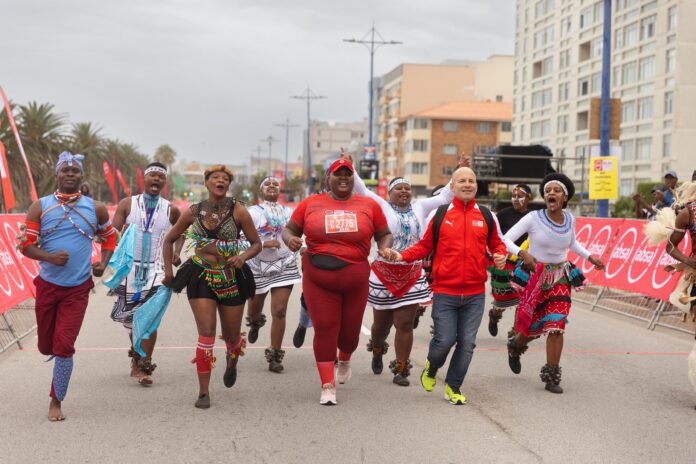GQEBERHA – In the next few months, hundreds of thousands of runners will converge on four of South Africa’s biggest cities for the Absa Run Your City Series. Big city races include Gqeberha in Port Elizabeth, which was the first to set things in motion on Sunday April 7, and will be followed by Cape Town Sunday May 12, Durban Sunday July 7 and Tshwane, Pretoria August 25, with the final Joburg leg set for September 24.
This is one of the best, fun-filled races in the country that accommodates both experienced and amateur distance runners. Below, we unpack key takeaways from our very first participation in the race during the first leg of the 2024 Absa RYC (Gqeberha) – to help those looking to up their running game for future races.
Stay the course
Granted, 10km can be a bit daunting for runners of all kinds, particularly newbies, but what we loved about the Absa Run Your City Gqeberha was the interesting mix of participants it drew; from elite competitors and previous record holders and the typical unsung hero in the likes of Gcibiss Mpontsi, who despite being the last-place finisher, was a first-timer and was extremely proud and happy to have gathered enough courage and willpower to cross the finishing line.

And while for some amateur runners, things may not go according to plan, while others may not even get to finish the race, there’re key takeaways for every single participant, which will no doubt set them on the right path for the future.

While elite competitors such as the Kenyans Vincent Kibet Langat and Diana Chepkorir, who aced the 2024 Gqeberha competition to win the male and female races respectively were lauded for their exceptional performances on the day, Mpontsi’s story is a testament to the triumph of the human spirit. In true nature of marathons and long distance races, she represents ordinary men and women who dare to chase their dreams often at odds with their grim realities.
Looking at her slowly but surely make her way to the finish line despite the obvious cloud of exhaustion covering her, it was good to observe how this gave her a great sense of a accomplishment; that to her, this achievement meant she was as capable as the other top performers. What other better lesson that this!
Mental readiness
In the early days of their running career, many runners don’t realise how important mental readiness is. However, having a good grasp of this the sooner the better; several studies indicate that cultivating the ‘can do’ attitude before and during the race – through skills as positive self-talk, goal setting, imagery, and relaxation techniques – is critical to helping improve endurance performance.
“The race is so much of a mental challenge, as well as a physical challenge,” an advice decorated American marathoner and former executive editor of Runner’s World Amby Burfoot once dished out to prospective distance runners. “So I tell people to have their mantras figured out in advance and have them rehearsed and ready to go when you need them.”
Nutrition and physical training
Many newbie runners report not paying much attention to their diet into their prior training regimens.
The effects of poor nutrition and, as well as failure to incorporate core strength training ahead of the race can cause frequent running related injuries and even anxiety about your ability to push through the race. Another issue, which a runner in our group experienced was gastrointestinal tract problem, which saw her vomit during the race.
While exercise-induced vomiting is among issues common for endurance athletes, this brings us to the importance of adjusting one’s diet as part of a complete training regimen prior to the race – advisably from the first week of training to ensure that their body has all the nutrients it needs. Distance running – 10k, half marathon or full marathon – are all high calorie burning endurance races that require a solid nutrition plan. To stay energised throughout the race, they need a mix of carbohydrates, protein and fats.
For best results, high-quality carbohydrates such as whole-grain breads, cereals, rice, pasta and starchy vegetables, fruit, low-fat milk and yogurt should make up most of the diet. Johns Hopkins Medicine journal recommends including lean protein foods such as fish, poultry, beans, lentils and tofu, as well as healthy fats such as olive oil, avocado and nuts.


Power of crowds
For most runners, the energy the crowds give matters greatly, something which many first timers would wish they knew before. As for me, every time I was greeted by loud cheers from the sidelines and the high fives from cheerful spectactors along the way, it certainly gave me a little bit of the much-needed adrenaline rush, which in turn gave me the motivation to push ahead. However, I learned from past experiences never to get too carried away, and rather saved the energy for the last part of the race.

However, not everyone reacts the same to crowds cheers or being ‘intensely’ watched and surrounded by crowds of people. Some runners may feel intimidated, which may affect their motivation or personality traits. If this describes you, perhaps consider entering much smaller, more remote races to get you used to running in front of a crowd as opposed to mass running events like the Absa Run Your City, which this year doubled the number of entries to 4 000 plus.
- For more info on upcoming races and how to enter, visit: www.runyourcityseries.com

